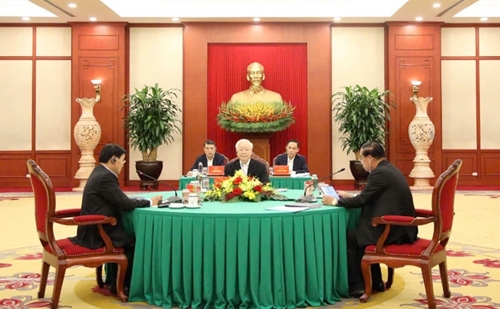"Since the beginning of the 13th National Congress of the Communist Party of Vietnam, Party General Secretary Nguyen Phu Trong directly conducted over 100 external affairs activities, including some that were exceptionally important and historically significant, laying the foundation and long-term direction for Vietnam's relations with other countries," said comrade Le Hoai Trung.
    |
 |
|
Party General Secretary Nguyen Phu Trong, Chairman of the Cambodian People's Party (CPP) Samdech Techo Hun Sen, and General Secretary of the Lao People's Revolutionary Party and President of Laos Thongloun Sisoulith at a high-level meeting in Hanoi in September 2023 |
He noted that participating in more than 100 external affairs activities is a considerable number, especially given that the early part of the 13th Central Committee of the Communist Party of Vietnam’ term (2021-2022) coincided with the COVID-19 pandemic. "Despite this, each activity was meticulously and scientifically prepared by comrade Nguyen Phu Trong. For significant activities, we reported directly to the Party General Secretary five to seven times. Despite a heavy workload and health challenges, he consistently listened, studied thoroughly, and gave decisive directions. His dedication to work was truly impressive," shared comrade Le Hoai Trung.
As the top leader of the Communist Party of Vietnam for nearly three terms, Party General Secretary Nguyen Phu Trong, along with the Party Central Committee, the Politburo, and the Secretariat, assessed situations accurately and proposed timely and appropriate policies. The Politburo and Secretariat issued important directives on the Party's external relations. National interests were officially mentioned in documents of the Party's 11th National Congress, then documents of the Party's 13th National Congress emphasized "ensuring the highest national interests based on fundamental principles of the United Nations Charter and international law, equality, cooperation, and mutual benefit." The documents highlighted that Vietnam is always a friend, a reliable partner, and a responsible member of the international community while promoting multilateral diplomacy.
The Party's 13th National Congress for the first time introduced the policy of building a comprehensive and modern diplomacy on three pillars: Party external relations, State foreign affairs, and people-to-people diplomacy. This new policy reflects the maturity of Vietnam's revolutionary diplomacy and addresses urgent and strategic requirements in the country's external affairs. Politburo Resolution No.34-NQ/TW dated January 9, 2023, identifies the Party's external relations as the core in directing foreign policies, developing good relations with political parties, and contributing to building and consolidating the political foundation, facilitating Vietnam's relations with other countries and partners. "The Communist Party of Vietnam currently has relations with nearly 260 parties in 115 countries, of which 70 to 80 percent are communist parties, ruling parties, and parties joining the coalition governments," said comrade Le Hoai Trung.
Party General Secretary Nguyen Phu Trong affirmed that the current external affairs are not only a continuation of internal affairs’ policies but also a strong motivation for national development. He developed theories and summarized practices on the external affairs and diplomacy of the Ho Chi Minh era, highlighting a unique Vietnamese diplomatic style akin to "Vietnamese bamboo." According to comrade Le Hoai Trung, many of General Secretary Nguyen Phu Trong's speeches, directives, and studies, which were incorporated into important works related to external affairs, Party building, national unity, national defense, and security, provide a comprehensive view of the country's status and strength, forming a basis for the external affairs sector.
Under the leadership of the Party, headed by General Secretary Nguyen Phu Trong, in recent years, all aspects of external affairs, such as politics, national defense, security, economy, and culture, have been expanded. External affairs have significantly contributed to maintaining national independence and sovereignty, addressing border and territorial issues like land border demarcation with Laos and Cambodia, and negotiating maritime issues with neighboring countries, including China, contributing to preserving a peaceful environment for development.
Additionally, external affairs have highlighted achievements in democracy and human rights in Vietnam, effectively countering actions that affect political and social stability, while maintaining relations with other countries. Vietnam remains steadfast in pursuing independence, self-reliance, peace, friendship, cooperation and development, diversification and multilateralization of external relations, and active and pro-active international integration, thus achieving significant results. Vietnam focuses on enhancing bilateral relations with neighboring countries through increased political trust, mutual understanding, and substantial economic growth, alongside advancements in other areas. Recently, international media have highlighted visits to Vietnam by leaders of the world's top three powers, including the United States, China, and Russia, within nine months. Additionally, for the first time, the Vatican's Secretary of State visited Vietnam in 2024.
Following General Secretary Nguyen Phu Trong’s example, to further promote the pioneering role of external affairs and diplomacy, comrade Le Hoai Trung emphasized the need to thoroughly grasp and implement the Party's external policies; continually improve the quality of situation assessment, strategic forecasting, and advisory work; and focus on summarizing theoretical achievements in external affairs based on past experience and accomplishments, effectively contributing to summarizing 40 years of national comprehensive renewal process and five years of implementing the external policy of the Party’s 13th National Congress, and drafting documents for the 14th National Congress of the Communist Party of Vietnam.
Translated by Trung Thanh